

Higher Logic alternatives are software platforms and tools that provide similar features to Higher Logic for managing online communities, member engagement, and marketing automation.
These alternatives, such as Circle and Teach.io, offer options for organizations looking to create interactive spaces for their members, automate communications, and strengthen relationships with their audience. They typically include features like discussion forums, event management, email marketing, and member directories. Organizations might seek alternatives to Higher Logic for cost, specific feature needs, ease of use, or better integration with their existing systems.
When considering higher logic alternatives, organizations often have specific reasons for exploring other options. These motivations can range from financial considerations to functional requirements. Here are common reasons why organizations might look for a Higher Logic alternative:
Higher Logic’s pricing can strain budgets, especially for smaller organizations or those with limited resources. Many alternatives offer more budget-friendly options or tiered pricing that allows organizations to pay only for the features they need. Some platforms like Higher Logic provide better value by including more features in their base plans.
For growing organizations, controlling costs while scaling up is crucial. Alternatives that offer flexible pricing models or more affordable enterprise plans can be very attractive to organizations looking to manage their expenses.
The #1 to make money online with TikTok Search (FREE TRAINING)

While Higher Logic offers a comprehensive set of tools, it may not cover all the specific needs of every organization. Some industries require specialized features that Higher Logic doesn’t provide. For example, an organization might need advanced event management tools, specific types of member directories, or unique engagement metrics.
Alternatives that cater to niche markets or offer more customizable feature sets can fill these gaps. Organizations often seek platforms that align more closely with their specific workflows or industry standards, driving them to explore alternatives with more tailored functionality.
Seamless integration with existing software ecosystems is crucial for many organizations. Higher Logic may not always offer smooth connections with all the tools an organization uses, such as specific CRM systems, marketing automation platforms, or analytics tools.
This can lead to inefficiencies and data silos. Higher logic alternatives that provide a wider range of integration options or more flexible API access become highly attractive. Organizations often prioritize platforms that can easily connect with their entire tech stack, ensuring smooth data flow and consistent user experiences across all their systems.
As organizations grow and evolve, their community management needs often become more complex. Some organizations find that Higher Logic struggles to keep pace with their expanding requirements.
This could involve limitations in handling larger member bases, supporting more diverse community structures, introducing new ways to monetize (such as through digital products), or adapting to new engagement strategies. Alternatives that offer more flexible scaling options, such as the ability to add new features or community spaces as needed, become appealing. Organizations often seek platforms that can grow with them, accommodating increasing demands without requiring a complete system overhaul.
Higher Logic’s user interface and overall user experience can be challenging for some organizations, especially those with less tech-savvy members or staff. A platform that’s difficult to navigate can lead to reduced engagement.
Alternatives that offer more intuitive, modern interfaces with easier learning curves are often sought after. Organizations frequently look for platforms that provide a smooth experience for both administrators and users, with clear navigation, mobile responsiveness, and accessible design. User-friendly alternatives can significantly boost community participation and reduce the need for extensive training.
Reliable and responsive customer support is crucial for maintaining a smooth-running community platform. Organizations that experience issues with Higher Logic’s customer service, such as slow response times, difficulty resolving problems, or lack of personalized assistance, often seek alternatives known for better support.
This includes platforms offering faster response times, more accessible support channels (like live chat or phone support), and comprehensive documentation or training resources. Good customer support can significantly impact an organization’s ability to effectively manage and grow its community, making it a key factor in choosing a Higher Logic alternative.
Higher Logic’s learning curve can be a barrier for some users, which may prompt them to seek simpler platforms. Here’s why:
For these reasons, some organizations might prefer alternatives that offer a better balance between functionality and ease of use. They might look for platforms that are quicker to learn and implement, even if they have fewer advanced features. This can help ensure that both staff and members can start using the platform effectively with minimal delay or frustration.
Several paid alternatives to Higher Logic offer a range of features for community management and member engagement. These platforms cater to different needs, from small organizations to large enterprises.
Each Higher Logic alternative brings unique strengths in user experience, specific features, or integration capabilities. Some excel in course creation, others in membership management, and some in overall community building.
When comparing these alternatives to Higher Logic, consider factors like scalability, customer support quality, customization options, and overall value for your investment. The right choice depends on your organization’s size, technical expertise, budget, and specific community goals. Here’s a list of the best Higher Logic alternatives:
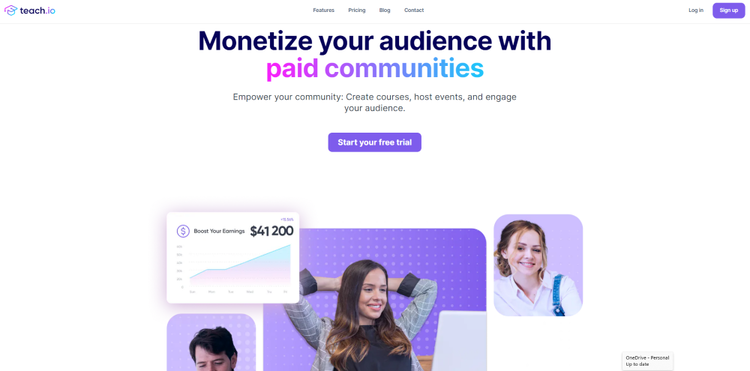
Teach.io offers a comprehensive platform for online course creators and digital entrepreneurs. It combines course hosting and community management in one package. Users can create and sell courses, manage memberships, and foster student engagement through discussion forums and live sessions.
Teach.io stands out with its user-friendly interface and analytics, helping course creators track student progress and engagement. The platform suits beginners and experienced educators, providing templates for easy course creation and advanced customization options. Teach.io excels in the e-learning ecosystem, making it ideal for individual instructors, small companies, coaching businesses, and educational institutions. Compared to Higher Logic, Teach.io focuses more on course delivery and student interaction, offering better tools for online education.
Try Teach’s 14-day free trial.
Vanilla Forums offers a platform for creating online communities with open-source and cloud-based options. Users can customize themes, implement gamification elements, and integrate with other tools easily. The software excels in flexibility, allowing extensive customization to match brand needs. Moderators benefit from built-in tools to manage discussions effectively.
Vanilla Forums suits a wide range of users, from small businesses, such as lifestyle and fitness coaches, to large enterprises. It particularly shines in customer support communities and developer forums.
Compared to Higher Logic, Vanilla Forums offers more flexibility in design and integration options. However, it may require more technical expertise to fully utilize its features. The platform scales well for growing communities and provides good value for organizations needing a highly customizable solution.
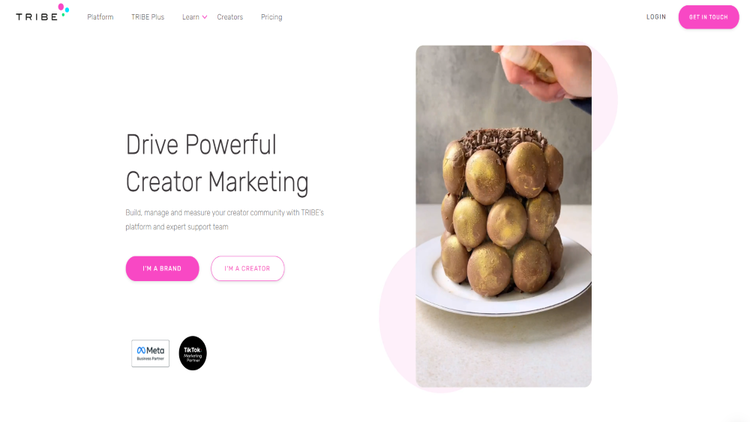
Tribe focuses on helping businesses create branded online communities. The platform offers extensive customization options, allowing users to align the community’s look and feel with their brand. Members can engage through discussion forums, social feeds, and private messaging.
Tribe supports various third-party integrations, enhancing its functionality. The platform provides detailed analytics to track engagement and community health.
Tribe works well for businesses of all sizes looking to build customer or employee communities. It excels in creating spaces for product feedback, customer support, and brand advocacy.
Compared to Higher Logic, Tribe offers a more modern interface and easier customization. However, it may have fewer specialized features for association management. Tribe provides good scalability and value for businesses prioritizing brand consistency in their community.
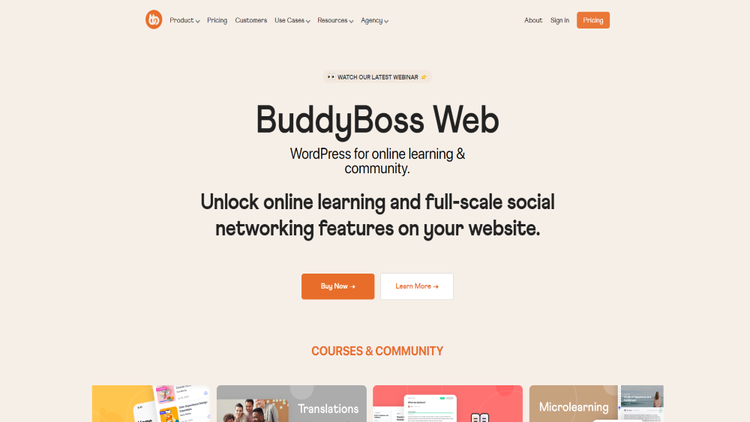
BuddyBoss builds on WordPress to create comprehensive social networks and online communities. It offers features like social groups, activity feeds, forums, and private messaging.
Users can use WordPress’s vast ecosystem of plugins to extend functionality. BuddyBoss suits organizations familiar with WordPress and those wanting to combine a community with other website functions. The platform excels in educational communities, membership sites, and social networks.
Compared to Higher Logic, BuddyBoss offers more flexibility in combining community features with other website elements. However, it may require more technical knowledge to set up and maintain. BuddyBoss provides excellent value for WordPress-savvy users who need a highly customizable community platform.

Mighty Networks caters to creators who are building and managing online communities. It offers features for event management, course hosting, and monetization. Users can create sub-groups, host live events, and engage in rich discussions. The platform focuses on helping community leaders generate income through memberships and paid content.
Mighty Networks suits individual creators, coaches, and small to medium-sized businesses. It excels in communities centered around learning, personal development, and niche interests.
Compared to Higher Logic, Mighty Networks offers better course creation and monetization tools. However, it may have fewer options for large-scale association management. Mighty Networks provides good scalability for growing creator communities and offers strong value for those combining community building with content monetization.

Circle aims to help creators build engaging virtual communities with ease. It features live streaming capabilities, event management tools, and integrated payment options for monetization. Users can create and manage community spaces for member interactions, content sharing, and event participation.
Circle prioritizes simplicity and user-friendliness, making it accessible to those new to community management. The platform suits individual creators, small businesses, and online course providers. It excels in communities focused on learning, networking, and content consumption.
Compared to Higher Logic, Circle offers a more streamlined, modern interface and easier setup. However, it may lack some advanced features for large organizations. Circle provides good value for creators wanting a straightforward, all-in-one community platform with monetization options.
The #1 to make money online with TikTok Search (FREE TRAINING)

Organizations looking for free Higher Logic competitors can find several platforms that offer basic community management features without the cost. These platforms can be a good starting point for small groups or those testing the waters of online community engagement.
Discourse offers a popular open-source Higher Logic alternative with many features similar to Higher Logic. It provides a modern, customizable forum experience with topics, categories, and user profiles. Users can enjoy rich media embeds, notifications, and mobile responsiveness.
Discourse shines with its clean interface, powerful search functionality, and community moderation tools. However, it requires self-hosting, demanding technical skills or resources for setup and maintenance. While the software is free, organizations may face hosting costs.
Discourse suits tech-savvy groups or those with IT support, especially in the open-source community, education sector, or product support forums. It offers high flexibility but may lack some specialized features for membership management or advanced marketing automation.
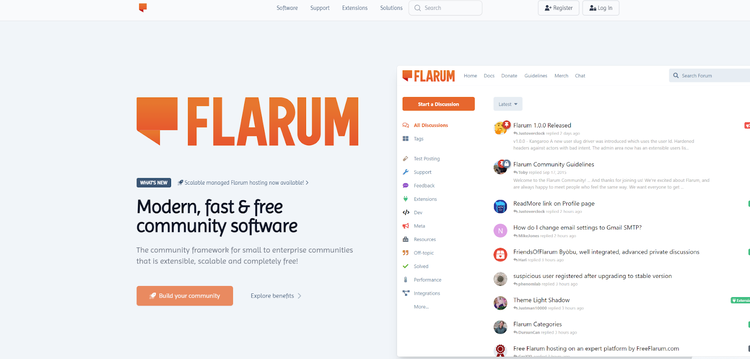
Flarum is a lightweight, modern forum software. It features a responsive design that works well on both desktop and mobile devices. Flarum provides essential forum functions like threaded discussions, user profiles, and notifications. The platform stands out for its simplicity and ease of use, making it ideal for small to medium-sized communities.
Flarum supports extensions, allowing users to add extra features as needed. However, it may lack some of the more advanced tools for member management and marketing automation that Higher Logic offers.
Flarum works best for organizations that want a straightforward, cheaper alternative to Higher Logic and an attractive discussion platform without complex features.
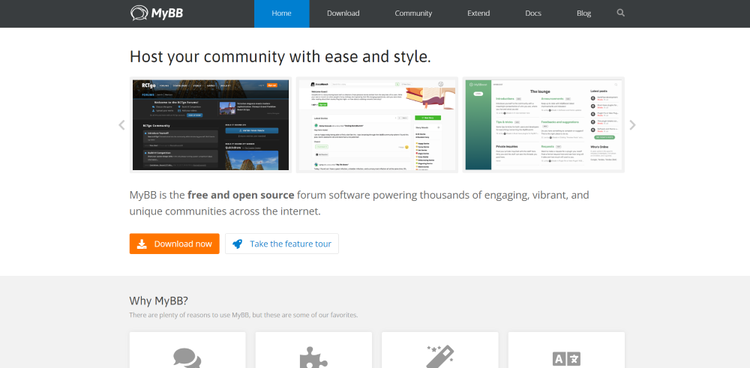
MyBB offers many features, including user registration, private messaging, and customizable themes. MyBB supports multiple languages and has a large community of developers who create plugins to extend its functionality. The software allows for detailed user permissions and moderation tools, making it suitable for larger communities.
While MyBB offers more features than other free alternatives, it may require more technical knowledge to set up and customize fully. MyBB suits organizations that need a full-featured forum platform and have the technical resources to manage it effectively.
When looking for Higher Logic alternatives, organizations have many options. Free platforms like Discourse offer basic features, while paid ones like Vanilla Forums provide more tools.
However, Teach.io stands out by combining community engagement with online learning. It’s perfect for those wanting to create engaging learning communities. Teach.io offers course creation, sales, and community management in one package. To see if it fits your needs, why not try Teach.io’s 14-day free trial? It’s a great way to explore how Teach.io can transform your community into a thriving learning ecosystem.





